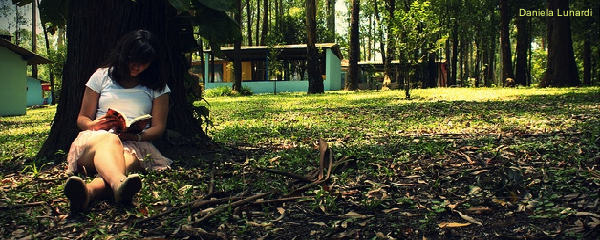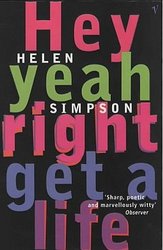
photo by Daniela Lunardi
Shortlisted for the THRESHOLDS Feature Writing competition,
Carys Bray recommends Helen Simpson’s short story collection,
Hey Yeah Right Get a Life.
At the conclusion of the short story ‘Cafe Society’ in her critically acclaimed collection Hey Yeah Right Get a Life, Helen Simpson writes, ‘It’s important to put up a decent apologia for your life; well, it is to other people, mostly; to come up with a convincing defence, to argue your corner… and if you can’t, or won’t, you will be shunned.’ When I first discovered Simpson’s writing I, like the women in ‘Cafe Society,’ was struggling to put up a decent apologia for my life; a sleep-deprived decade raising four children and the loss of my community when I turned my back on my strict Mormon upbringing had left me feeling like the title story’s Dorrie: ‘I can’t see how the family would work if I let myself start wanting things again… give me an inch and I’d run a mile.’ When I did finally allow myself to want something, I ran, or more precisely drove, to a Creative Writing MA course at Edge Hill University and it was there that I came across Simpson’s short fiction.
 I was workshopping a short story about an awkward moment between a mother and daughter when tutor Jo Powell encouraged me to read Hey Yeah Right Get a Life. She even leant me her own well-loved copy, an act of kindness that I appreciated more with each turn of the page. Simpson’s stories were bursting with beautifully described reality; a crying child was compared to ‘a small combustion engine, full of distress,’ a teenager was ‘never going to go dead inside or live somewhere boring’ and the mothers were ‘as rabidly desperate as a talentless stand-up comedian.’ Simpson’s collection articulated so many of the things that I had felt, but never had the courage or skill to put into words. I grew up in a community in which men, referred to as prophets, repeatedly insist that motherhood should be both the sole focus, and the single most rewarding experience, of women’s existence: ‘When you have fully complemented your husband in home life and borne the children, growing up full of faith, integrity, responsibility, and goodness, then you have achieved your accomplishment supreme, without peer, and you will be the envy of all through time and eternity’ (Kimball, 1982: 327). Admissions of maternal ambivalence were implicitly verboten – I am one of five children and I have never heard my mother grumble, about anything – how could she, when to complain would be to question her divine role, as prescribed by God’s mouthpiece on earth? Simpson’s often irreverent, sometimes scathing and frequently humorous treatment of parenthood, familial harmony and gender expectations kept me turning the pages; I gobbled the collection in one greedy read.
I was workshopping a short story about an awkward moment between a mother and daughter when tutor Jo Powell encouraged me to read Hey Yeah Right Get a Life. She even leant me her own well-loved copy, an act of kindness that I appreciated more with each turn of the page. Simpson’s stories were bursting with beautifully described reality; a crying child was compared to ‘a small combustion engine, full of distress,’ a teenager was ‘never going to go dead inside or live somewhere boring’ and the mothers were ‘as rabidly desperate as a talentless stand-up comedian.’ Simpson’s collection articulated so many of the things that I had felt, but never had the courage or skill to put into words. I grew up in a community in which men, referred to as prophets, repeatedly insist that motherhood should be both the sole focus, and the single most rewarding experience, of women’s existence: ‘When you have fully complemented your husband in home life and borne the children, growing up full of faith, integrity, responsibility, and goodness, then you have achieved your accomplishment supreme, without peer, and you will be the envy of all through time and eternity’ (Kimball, 1982: 327). Admissions of maternal ambivalence were implicitly verboten – I am one of five children and I have never heard my mother grumble, about anything – how could she, when to complain would be to question her divine role, as prescribed by God’s mouthpiece on earth? Simpson’s often irreverent, sometimes scathing and frequently humorous treatment of parenthood, familial harmony and gender expectations kept me turning the pages; I gobbled the collection in one greedy read.
People have joked that the stories in this collection may be the ultimate contraceptive; I disagree. Parenthood is, to purloin Dickens, the best of times and the worst of times, and Simpson herself notes that parents can ‘be very happy and very miserable at the same time’ (The Guardian, 2012). The title story traces Dorrie’s day, from an ‘early morning garden’ to ‘a midnight kitchen.’ The language in this story is poetic and fresh; Dorrie is ‘broken… into little pieces like a biscuit’ and ‘scattered all over the place,’ while the children live through ‘as many variants of passion as occur in the average Shakespeare play’ before they go downstairs for breakfast. When Dorrie’s son, Robin climbs into his parents’ bed in the morning, his eyes are described as ‘guileless, unguarded and intent,’ he gives ‘a little beatific smile,’ and his chest is ‘like a huge warm baroque pearl.’ This story is replete with keenly observed, humorous dialogue, from the judgements of the mothers at the school gate: ‘Look at her nails… you can always tell. Painted fingernails mean a rubbish mother,’ to the children’s unsuitable meal time conversation: ‘Kosenia scratched her bandage off today, and she’s got eczema, and she scratched it off, you know, that stuff on top, like the cheese on the Shepherd’s Pie, she just lifted it off.’ Simpson also depicts the loneliness and confinement of parenthood. Dorrie feels that she has, ‘schooled herself to harmlessness, constant usefulness to others… [she is] a big fat zero,’ and husband Max bemoans the loss of his ‘lively and sparky’ wife; he feels burdened by his three children, by ‘the whole pack of them on his back.’
While many of the stories in this collection feature children, some concentrate on adult relationships. In the very topical ‘Burns and the Bankers’ the reader views a corporate Burns supper through law firm partner Nicola’s unwavering gaze. The ballroom where the party takes place is filled with ‘an immense prosperous hum,’ and young bankers smile at their superiors like ‘stiff-necked nutcrackers, the ricti of servile mirth barring their teeth.’ No-one escapes Nicola’s scrutiny: Mrs Mahon has ‘the dusty look of one who has no desires of her own,’ the Scots are ‘blowhard old windbags’ and Alistair Wallace rattles out ‘anecdotes in thick hawking gutturals.’ The story concludes with an undignified, drunken brawl which is also viewed through Nicola’s attentive eyes: ‘She watched him as he sprawled and brawled in the churning tartan-flashing stramash of bottles and leftovers. You are the father of my children, she said silently. But don’t push it too far. Pal.’
 Simpson explores the impact of work on relationships in many of the stories in this collection. In ‘Opera’, Christopher cajoles Janine into spending their anniversary entertaining his clients. Janine tries to be accommodating, but in the end she cracks and insults a client, calling him a ‘cloth-eared berk.’ In ‘Cheers’ Simpson hints at marital difficulties from the outset; Lois watches her husband lying asleep with his mouth ‘half-open, a little pocket of rotten-fruit breath playing at its entrance,’ and she is tempted to, ‘light a match a couple of inches above his teeth and watch the ghostly blue flames dance over his features.’ But it’s only later in the story, during a meal out with a friend, that Lois realises her husband has borrowed money from somewhere without telling her; money he can’t pay back. And as she walks home past windows decorated with Christmas trees, it also dawns on her that, ‘The house would go too, that was it. And he couldn’t tell her.’
Simpson explores the impact of work on relationships in many of the stories in this collection. In ‘Opera’, Christopher cajoles Janine into spending their anniversary entertaining his clients. Janine tries to be accommodating, but in the end she cracks and insults a client, calling him a ‘cloth-eared berk.’ In ‘Cheers’ Simpson hints at marital difficulties from the outset; Lois watches her husband lying asleep with his mouth ‘half-open, a little pocket of rotten-fruit breath playing at its entrance,’ and she is tempted to, ‘light a match a couple of inches above his teeth and watch the ghostly blue flames dance over his features.’ But it’s only later in the story, during a meal out with a friend, that Lois realises her husband has borrowed money from somewhere without telling her; money he can’t pay back. And as she walks home past windows decorated with Christmas trees, it also dawns on her that, ‘The house would go too, that was it. And he couldn’t tell her.’
There are other things that can’t be told. When the character Dorrie returns for the final story, ‘Hurrah for the Hols,’ she can ‘barely speak for rage,’ but she is so used to the feeling that she doesn’t ‘assign it much importance’ and merely wonders, ‘Who else… could be living at such a pitch of passion as she in the midst of this crew; so uncontrolled, so undefended?’ Simpson’s meticulous attention to emotional detail is one of the most appealing features of her writing – when I read this collection for the first time I repeatedly thought, ‘Yes,’ and, ‘Absolutely right,’ and, ‘That’s exactly how it is.’ I bought a copy of Hey Yeah Right Get a Life as soon as I finished reading Jo Powell’s copy, and then I bought every one of Simpson’s previous and subsequent collections, and I gobbled them too.
Jo Powell died suddenly last year, not long before the mother and daughter story I had been workshopping was published. By introducing me to Simpson’s writing, Jo allowed me to realise something that Simpson herself articulated in a Guardian interview: ‘It does seem ridiculous that describing domestic work and life – the daily reality of most women in the world – is seen as letting the side down’. Another of my favourite writers, Carol Shields, once said with some pride, that she made a point of including items like, ‘wallpaper… cereal bowls, cupboards, cousins, buses, local elections, head colds, cramps, newspapers,’ in her writing. The more short stories I read, the more confidently I am able to assert the following: domestic details don’t trivialise fiction, they humanise it. In ‘Wurstigkeit’, a story about an exclusive shop with a secret password, Simpson details a collection of beautiful clothes, ‘silks and velvets… raspberry-coloured and almost raspberry-scented… fine as a baby’s skin.’ When it is time to pay for the clothes, pregnant Isobel says to Laura, ‘You’ve got to make choices… You can’t have everything.’ And Laura replies, ‘Why not… Here at least.’ Simpson’s collection is analogous with the clothes shop Wurstigkeit. It’s a place where the reader can have everything – wit, insight, acumen, sensitivity and luscious prose.
I recently reread Hey Yeah Right Get a Life. As I luxuriated in Simpson’s vibrant prose, the effect was nostalgic rather than contraceptive. I ached for the time when my children used to fling themselves at me at the end of the school day, when they patted me with blunt, baby-padded hands and made grandiose statements about loving me most in all the world. I could suddenly relate to the old woman who offers unsolicited advice to the exhausted mothers in ‘Cafe Society’: ‘Make the most of it… It goes so fast… Such a short time.’ And yet, even as the thought settled and attempted to make itself at home, another part of me – the hard-nosed, pragmatic part – laughed and countered, hey yeah right, get a life.
*
Carys Bray’s debut story collection, Sweet Home, has been selected as joint winner of the 2012 Scott Prize and will be published later this year by SALT Publishing.
Helen Simpson’s new collection, A Bunch of Fives: Selected Stories, is published this week by Vintage Classics.


Carys, really interesting review. I’ve read several of her collections. It’s interesting how her agenda has developed and changed (the wit is still the same.) My view on her feminist agenda and showing real life is that the best short stories are all about showing real life in its pithy detail and she does that without ever banging the drum too loudly. Burns and the Bankers is my favourite, she shows a world I spent years living in with simple clarity.
Thank you Dora. I do hope you enjoy Helen Simpson’s short stories.
Carys thank you for your honesty. I so relate to your struggle. I grew up in a town with a very narrow set of “do’s” and “don’ts,” I wish I could say I was attracted to the “do’s” but unfortunately that wasn’t the case. And I can’t, for the life of me, keep a clean house! There’s too many other wonderful things to do in this world, like working on my writing, and reading Thresholds….I will have to get a hold of Helen Simpson’s work too.
Wonderful article.
No Juliet, keep tidying. I wish it was a priority for me too! I’ve read the first two stories Carys suggested. Thank you again Carys. They’re marvellous. The first intelligent, desperate and funny and the second, dead scary. I was only offered a couple of paragraphs of the third and I’ll have to buy the book, it was a great beginning, both kind and sinister. And, as you say, no whining at all. I’m hooked!
The economic power issue is pretty much a taboo subject, isn’t it? I’m glad someone’s writing about it.
Amanda – I love the idea of ‘practical feminism’. Am I letting the side down by having a tidy house?? Will attempt to be more sluttish in future…
As for Helen Simpson, I think her work is deeply feminist. She asks very serious questions about the role of women in Western society, but she does this with the lightest of touches. I have just re-read the story ‘Early One Morning’ from the collection ‘Constitutional’. It’s brilliant on motherhood, marriage, divorce. Here is an extract, in which the MC, Zoe, muses on the dynamic between men and women, particularly the economic dynamic in a relationship:
“It was nothing short of dangerous (thought Zoe) not to keep earning, even if it wasn’t very much and you were doing all the domestic and emotional work as well, for the sake of keeping the marital Black Dog at bay. Otherwise if you spoke up it would be like biting the hand that fed you.”
Economic power = sexual power? There’s a debate around this, of course, but the point is that HS is not afraid to tackle these feminist questions.
I should also say that this story is hilariously funny, with some classic observations on make-up and ageing. And sea-snakes. Not to be missed!
Thanks for the thought-provoking piece, Carys.
How very kind of you Carys. I will drink a glass of wine in my (shabby but recently cleaned up in honour of boyfriends) house (where’s the feminism in that? I’ve revealed the weakness of my ideals in two short comments) and read the stories tonight. Will I be able to get a good night’s sleep? We’ll see.
Amanda, I wish this was a real life conversation – I would invite you to my (messy) house for a drink and lend you my copy of ‘Hey Yeah Right Get A Life’ so that you could test the waters!
Below are a few links, the first is to one of the stories from ‘Hey Yeah Right Get A Life,’ the second and third stories come from two of Simpson’s other collections:
http://www.barcelonareview.com/22/e_hs.htm
http://www.newyorker.com/fiction/features/2009/12/21/091221fi_fiction_simpson
http://www.prospectmagazine.co.uk/2005/09/thedoor/
Feminist theory, I know nothing about but I do believe religiously in practical feminism and it sounds as if Helen Simpson’s work might be in line with that. I don’t want to buy the book and find myself boiling in anger. I have always thought, as a mother of several daughters, that it is my absolute duty to waste time, have fun and live in a filthy house. We have to lead by example. My own mother felt the same. And now, as my daughters are growing up and boys and men turn up, I observe closely how much clearing up these guys do after meals. How annoying am I? But I agree, the moments of pure frustration are very many. Literary Mama is a website publishing work by mothers. I think there are a few others.
Feminist theory isn’t something I’ve looked at since my BA, so I can’t give a very articulate response to that question however, I’d be really interested to read work on Simpson’s writing that has been informed by feminist literary criticism. I think it can be argued that the examination of women’s social roles and lived experience is a feminist endeavor, but I don’t want to put words in Simpson’s mouth – here are some longer excerpts of the interview that I quote in the article:
“Until very recently, literature drew women’s experiences through childhood, teenagehood, courtship, up to the point of marriage – and after that, they disappeared,” she points out. Partly, she believes, this is because motherhood is “so hard to write about. It was the first time I’d found you could be very happy and very miserable at the same time, and it’s hard to describe that state.” But she yearned for something that expressed her new reality. “When I had a child myself, I found everything was mirrored up to that point and then, whoosh! Nothing. There’s much more writing on the subject now, thank goodness.”
“This business of bringing up children is still in its infancy,” she says. “I’d have thought things would have improved by now, but I wonder what to say to my daughter, because they don’t seem to have got much easier. We’re at the point now, it seems, where as a mother you have your child and your work, and that’s fine: you’re allowed to juggle those two things. But say you want to waste a bit of time, or sit in the sun, or get drunk, all the things you used to do – any pure pleasure that isn’t directed either at work or family – you’re seen as a selfish so-and-so. And we’re forced, like the sisters in King Lear, to protest our love. Every time you say you’re exhausted, you have to follow up with ‘But of course it’s all wonderful . . .’ Why?”
http://www.guardian.co.uk/lifeandstyle/2010/may/28/helen-simpson-sex-violence
It sounds like Helen Simpson gets beneath the surface of domestic life with her observations and manages to voice it in an original way. Is there a feminist undertone to her writing or definitely not? I’d be interested to know. My father once described my sister and I as ‘a couple of sluts’ which we took offense to but I don’t think he meant it in the way we thought. My children always managed to look grubbier than everyone else’s but dirt is fun, however you look at it.